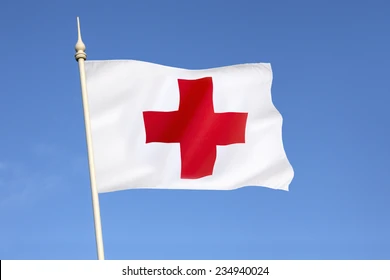
The International Committee of the Red Cross (ICRC) has been victim of several online disinformation campaigns since the beginning of the war in Ukraine that are putting at risk its staff and those it seeks to help.
Over the last few weeks, the ICRC says it has been the victim of “deliberate, targeted attacks” that use misinformation and disinformation to discredit its action.
These attacks include claims that the ICRC is participating in forced evacuations of Ukrainian refugees to Russia and negotiating the opening of a refugee camp in southern Russia.
The Geneva-based humanitarian organisation does not say who is behind the attacks but insists that false information was being spread mostly on social media.
“It’s not the first time that we see the devastating effects of misinformation on social media. But in this case, the scale is totally unprecedented. [It is] therefore very worrying to see the ICRC being instrumentalised in this way,” ICRC Director-General Robert Mardini told Swiss public television, RTS.
Having access to victims of war is a top priority for the ICRC. And being perceived as a neutral actor is key to the ICRC’s ability to provide that help.
“The level of politicisation of our work is jeopardising our ability to deliver desperately needed aid. Lives are at risk,” the ICRC said.
False information about the ICRC circulating online stems partly from questions about its dialogue with Russian authorities and misconceptions about what the organisation does and what it can and cannot do. We answer some of those questions.
What is the ICRC?
Why is the ICRC meeting top Russian officials?
Many people took to social media to express their outrage at pictures of Peter Maurer, the ICRC’s president, and Sergei Lavrov, Russia’s foreign minister, shaking hands and smiling in Moscow. Some have gone as far as to interpret the ICRC’s dialogue with Moscow as legitimising Russia’s invasion of Ukraine.
But the ICRC is a neutral and impartial humanitarian organisation. It has a mandate under international humanitarian law (IHL) to speak with all warring parties to demand that they respect the rules of war, and to ensure that its delegates can safely access those who need help.
“There are always diplomatic smiles. But that does not mean that our dialogue is not robust and exacting when it comes to the obligations of parties to the conflict,” Mardini told RTS.
Prior to meeting Lavrov, Maurer had been in Kyiv to talk to Ukrainian authorities too.
Why doesn’t the ICRC condemn Russia’s invasion of Ukraine?
Some people – including many in Ukraine who suffer from the war, or who have had to flee their homes – are frustrated by the ICRC’s refusal to condemn Russia’s invasion of Ukraine or to even call it a war (the ICRC prefers the term conflict).
As guardian of the Geneva Conventions, shouldn’t the ICRC denounce violations of IHL, for example indiscriminate attacks like the dropping of cluster bombs on populated areas?
Even Karim Khan, the International Criminal Court’s (ICC) prosecutor, said there was “a reasonable basis to believe that both alleged war crimes and crimes against humanity have been committed in Ukraine”. The ICC has launched an investigation into the situation in Ukraine.
But making bold public statements is not the ICRC’s job. Rights NGOs have already done so.
The priority for the ICRC is to gain safe access to places where help is needed on both sides, such as prisons, where the organisation checks on prisoners of war and other detainees. Through their humanitarian work, ICRC staff may learn about highly sensitive information that governments want to keep secret. If the ICRC is not trusted, it will not be allowed in.
The ICRC says it can better protect victims if its dialogue with conflict parties is confidential. If this approach completely fails, the ICRC may publicly comment on a situation but it avoids making one-sided condemnations.
In April 1994, shortly after the beginning of the genocide in Rwanda, the ICRC publicly called on the parties to end the “carnage”, “massacre” and “human tragedy”, but it refrained from using the term genocide for the safety of its staff.
Addressing the situation in Mariupol, Mardini told RTS that “the situation is unbearable, the fighting continues… a few weeks ago we were already saying that it was unacceptable, unbearable for civilians. This is still the case today and there are no safe evacuations of civilians, nor humanitarian aid that can enter Mariupol. So the situation is still very alarming”.
Why is the ICRC keen to open an office in Russia?
Maurer’s visit to Moscow was followed by accusations on social media that the ICRC had been negotiating the setting up of a refugee camp in southern Russia.
The ICRC clarified that it had no plans to set up any kind of camp but had been discussing the opening of an office in Rostov-on-Don. This is part of “a huge regional scale-up” to respond to humanitarian needs where they arise, the organisation added.
The ICRC has teams in other countries bordering Ukraine, such as Belarus, Hungary, Moldova, Poland and Romania.
Part of the ICRC’s work is to connect and reunite families separated by a war and to ensure the bodies of dead soldiers are treated with dignity and returned to their relatives. This too, requires a presence on both sides of the war.
Why has no aid arrived in Mariupol yet?
Some people have criticised the ICRC’s action – or rather its perceived inaction in some places in Ukraine. They have asked why civilians are risking their lives to escape Mariupol, in southern Ukraine, where thousands remain trapped with little to no access to electricity, water, food or medicine. Why has no aid arrived in the besieged city?
The answer is that the ICRC cannot stop bombs falling. It cannot enforce a safe passage for civilians to flee and for humanitarian convoys to enter.
In March, the ICRC, together with the Ukrainian Red Cross Society, facilitated two safe evacuation convoys. Thousands of civilians were able to leave the city of Sumy in northeast Ukraine for Lubny in the centre of the country.
The ICRC has sent Russian and Ukrainian authorities detailed proposals for safe passage operations out of Mariupol, but neither side could agree on their conditions. If an agreement is found, it is up to the warring parties to respect its modalities. These include the route, the start time and the duration of the operation.
The ICRC’s role is to accompany the civilian convoy and to remind soldiers on both sides that a humanitarian operation is underway.
Allegations have also circulated on social media that the ICRC was involved in forced evacuations from Ukraine to Russia. The ICRC has firmly denied ever supporting any operation against people’s will, which it says would be a violation of international humanitarian law.
Misinformation – whether intentional or not – directly threatens the ICRC and victims of war. As Mardini pointed out, it also “diverts attention away from where it should be, which is the obligation of parties to the conflict to respect and protect civilians, and to help humanitarians do their job”.




Telegram中文版 是一款注重隐私和安全的消息应用,提供端到端加密聊天等功能。